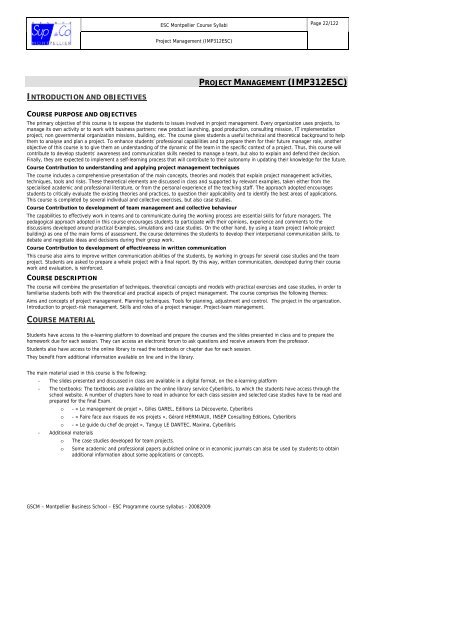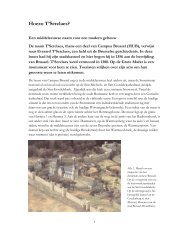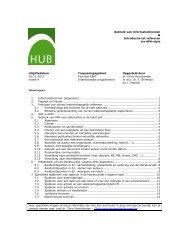esc montpellier course syllabi groupe sup de co ... - HUBRUSSEL.net
esc montpellier course syllabi groupe sup de co ... - HUBRUSSEL.net
esc montpellier course syllabi groupe sup de co ... - HUBRUSSEL.net
You also want an ePaper? Increase the reach of your titles
YUMPU automatically turns print PDFs into web optimized ePapers that Google loves.
INTRODUCTION AND OBJECTIVES<br />
ESC Montpellier Course Syllabi<br />
Project Management (IMP312ESC)<br />
GSCM – Montpellier Business School – ESC Programme <strong><strong>co</strong>urse</strong> syllabus - 20082009<br />
Page 22/122<br />
PROJECT MANAGEMENT (IMP312ESC)<br />
COURSE PURPOSE AND OBJECTIVES<br />
The primary objective of this <strong><strong>co</strong>urse</strong> is to expose the stu<strong>de</strong>nts to issues involved in project management. Every organization uses projects, to<br />
manage its own activity or to work with business partners: new product launching, good production, <strong>co</strong>nsulting mission, IT implementation<br />
project, non governmental organization missions, building, etc. The <strong><strong>co</strong>urse</strong> gives stu<strong>de</strong>nts a useful technical and theoretical background to help<br />
them to analyse and plan a project. To enhance stu<strong>de</strong>nts’ professional capabilities and to prepare them for their future manager role, another<br />
objective of this <strong><strong>co</strong>urse</strong> is to give them an un<strong>de</strong>rstanding of the dynamic of the team in the specific <strong>co</strong>ntext of a project. Thus, this <strong><strong>co</strong>urse</strong> will<br />
<strong>co</strong>ntribute to <strong>de</strong>velop stu<strong>de</strong>nts’ awareness and <strong>co</strong>mmunication skills nee<strong>de</strong>d to manage a team, but also to explain and <strong>de</strong>fend their <strong>de</strong>cision.<br />
Finally, they are expected to implement a self-learning process that will <strong>co</strong>ntribute to their autonomy in updating their knowledge for the future.<br />
Course Contribution to un<strong>de</strong>rstanding and applying project management techniques<br />
The <strong><strong>co</strong>urse</strong> inclu<strong>de</strong>s a <strong>co</strong>mprehensive presentation of the main <strong>co</strong>ncepts, theories and mo<strong>de</strong>ls that explain project management activities,<br />
techniques, tools and risks. These theoretical elements are discussed in class and <strong>sup</strong>ported by relevant examples, taken either from the<br />
specialised aca<strong>de</strong>mic and professional literature, or from the personal experience of the teaching staff. The approach adopted en<strong>co</strong>urages<br />
stu<strong>de</strong>nts to critically evaluate the existing theories and practices, to question their applicability and to i<strong>de</strong>ntify the best areas of applications.<br />
This <strong><strong>co</strong>urse</strong> is <strong>co</strong>mpleted by several individual and <strong>co</strong>llective exercises, but also case studies.<br />
Course Contribution to <strong>de</strong>velopment of team management and <strong>co</strong>llective behaviour<br />
The capabilities to effectively work in teams and to <strong>co</strong>mmunicate during the working process are essential skills for future managers. The<br />
pedagogical approach adopted in this <strong><strong>co</strong>urse</strong> en<strong>co</strong>urages stu<strong>de</strong>nts to participate with their opinions, experience and <strong>co</strong>mments to the<br />
discussions <strong>de</strong>veloped around practical Examples, simulations and case studies. On the other hand, by using a team project (whole project<br />
building) as one of the main forms of assessment, the <strong><strong>co</strong>urse</strong> <strong>de</strong>termines the stu<strong>de</strong>nts to <strong>de</strong>velop their interpersonal <strong>co</strong>mmunication skills, to<br />
<strong>de</strong>bate and negotiate i<strong>de</strong>as and <strong>de</strong>cisions during their group work.<br />
Course Contribution to <strong>de</strong>velopment of effectiveness in written <strong>co</strong>mmunication<br />
This <strong><strong>co</strong>urse</strong> also aims to improve written <strong>co</strong>mmunication abilities of the stu<strong>de</strong>nts, by working in groups for several case studies and the team<br />
project. Stu<strong>de</strong>nts are asked to prepare a whole project with a final report. By this way, written <strong>co</strong>mmunication, <strong>de</strong>veloped during their <strong><strong>co</strong>urse</strong><br />
work and evaluation, is reinforced.<br />
COURSE DESCRIPTION<br />
The <strong><strong>co</strong>urse</strong> will <strong>co</strong>mbine the presentation of techniques, theoretical <strong>co</strong>ncepts and mo<strong>de</strong>ls with practical exercises and case studies, in or<strong>de</strong>r to<br />
familiarise stu<strong>de</strong>nts both with the theoretical and practical aspects of project management. The <strong><strong>co</strong>urse</strong> <strong>co</strong>mprises the following themes:<br />
Aims and <strong>co</strong>ncepts of project management. Planning techniques. Tools for planning, adjustment and <strong>co</strong>ntrol. The project in the organization.<br />
Introduction to project-risk management. Skills and roles of a project manager. Project-team management.<br />
COURSE MATERIAL<br />
Stu<strong>de</strong>nts have access to the e-learning platform to download and prepare the <strong><strong>co</strong>urse</strong>s and the sli<strong>de</strong>s presented in class and to prepare the<br />
homework due for each session. They can access an electronic forum to ask questions and receive answers from the professor.<br />
Stu<strong>de</strong>nts also have access to the online library to read the textbooks or chapter due for each session.<br />
They benefit from additional information available on line and in the library.<br />
The main material used in this <strong><strong>co</strong>urse</strong> is the following:<br />
- The sli<strong>de</strong>s presented and discussed in class are available in a digital format, on the e-learning platform<br />
- The textbooks: The textbooks are available on the online library service Cyberlibris, to which the stu<strong>de</strong>nts have access through the<br />
school website. A number of chapters have to read in advance for each class session and selected case studies have to be read and<br />
prepared for the final Exam.<br />
o - « Le management <strong>de</strong> projet », Gilles GAREL, Editions La Dé<strong>co</strong>uverte, Cyberlibris<br />
o - « Faire face aux risques <strong>de</strong> vos projets », Gérard HERMIAUX, INSEP Consulting Editions, Cyberlibris<br />
o - « Le gui<strong>de</strong> du chef <strong>de</strong> projet », Tanguy LE DANTEC, Maxima, Cyberlibris<br />
- Additional materials<br />
o The case studies <strong>de</strong>veloped for team projects.<br />
o Some aca<strong>de</strong>mic and professional papers published online or in e<strong>co</strong>nomic journals can also be used by stu<strong>de</strong>nts to obtain<br />
additional information about some applications or <strong>co</strong>ncepts.




